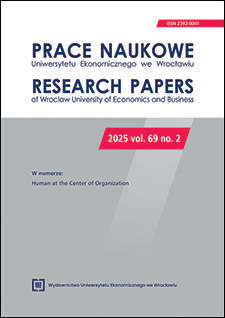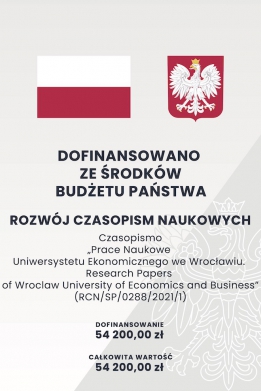Leadership in an Organization from the Perspective of Leaders and Employees
DOI:
https://doi.org/10.15611/pn.2025.2.07Keywords:
leadership, competencies of a leader, engagementAbstract
Aim: The purpose of the research was to determine how leadership is perceived in the organization and what challenges leaders face.
Methodology: The research method adopted was a diagnostic survey using a questionnaire. This survey was supported by a guided semi-structured interview.
Results: The conducted research allowed to conclude that both leaders and employees recognised that the basis of leadership is a common interpretation of the situation and environment, as well as inspiring employees. In the opinion of leaders and employees, a leader builds authority mainly through respect for others and the ability to make decisions. The most important features of a leader should be orientation towards success, determination and decisiveness, self-confidence, openness, empathy and emotional intelligence. The most important competencies included: team building, openness to change, supporting development and understanding business. In turn, diligence, justice and decisiveness are the main values that a leader should follow.
Implications and recommendations: Future research should explore how leadership expectations vary across different generational cohorts.
Originality/value: This research uniquely combines a broad-scale diagnostic survey with qualitative, semi-structured interviews, offering both quantitative robustness and rich contextual insights into leadership perception.Downloads
References
Adair, J. (1999). Być liderem. Wydawnictwo Petit.
Armstrong, M. (1997). Jak być lepszym menedżerem. Dom Wydawniczy ABC.
Avery, G. C. (2009). Przywództwo w organizacji. Paradygmaty i studia przypadków. PWE.
Bass, B. M., & Stodgill, M. R. (1990). Bass and Stodgill’s Handbook of Leadership: Theory, Research & Managerial Applications. Free Press.
Burns MacGregor, J. (1978) Leadership. Harper & Row.
Chen, L., & Wang, H. (2023). The Influence of Authentic Leadership on Employee Engagement: A Multilevel Analysis. Psychology Research and Behavior Management, 16 April, 1419-1420.
Fries, A., Kammerlander, N., & Leitterstorf, M. (2021). Leadership Styles and Leadership Behaviors in Family Firms:
A Systematic Literature Review. Journal of Family Business Strategy, 12(1), 9-11.
Goleman, D. (2004). What Makes a Leader? Harvard Business Review, 01/2004.
Irfan, M., Salameh, A. A., Saleem, H., Tahir Naveed, R., Dalain, A. F., & Shahid, R. M. (2022). Impact of Servant Leadership on Organization Excellence through Employees’ Competence: Exploring a Cross-Cultural Perspective. Environmental Economics and Management, 10, 7-9.
Kremer, H., Villamor, I. & Aguinis, H. (2019). Innovation Leadership: Best-Practice Recommendations for Promoting Employee Creativity, Voice, and Knowledge Sharing. Business Horizons, 62(1), 65-74.
Liguo X., Pingping F., Youmin X., Lin Z., Xinyu Z., Chunhui C., Ying L., Guiquan L., Xian X., & Jing G. (2014). Adding Dynamics to a Static Theory: How Leader Traits Evolve and How They Are Expressed, The Leadership Quarterly, 25(6), 1095-1119.
Matsunaga, M. (2024). Transformational Leadership in a Digital Era. In M. Matsunaga (Ed.), Employee Uncertainty over Digital Transformation (pp. 85-138). Springer. https://doi.org/10.1007/978-981-99-8409-1_3
Mrówka, R. (2010). Przywództwo w organizacjach. Oficyna Wolters Kluwer Business.
Northouse, P. G. (2013). Leadership. Theory and Practice. SAGE 6th Edition Thousand Oaks.
Obłój, K. (1994). Mikroszkółka zarządzania. PWE.
Smith, J. K. (2022). Transformative Leadership: Theory and Practice. Journal of Organizational Psychology, 32(4), 123-140.
Sonmez C., F., & Adiguzel, Z. (2020). Analysis of Leader Effectiveness in Organization and Knowledge Sharing Behavior on Employees and Organization. SAGE Open, 10(1).
Tokarski, S. (2006). Kierownik w organizacji. Centrum Doradztwa i Informacji Difin.
Tracy, B., & Scheelen, M. F. (2000). Nowoczesny menedżer sprzedaży. Poważna inwestycja w strategię XXI wieku. Muza.
Wachowiak, P. (2001). Profesjonalny menedżer. Difin.
Downloads
Published
License
Copyright (c) 2025 Maria Wanda Kopertyńska, Natalia Dernowska-Żaczyk, Katarzyna Stefaniuk-Żygadło

This work is licensed under a Creative Commons Attribution-ShareAlike 4.0 International License.
Accepted 2024-11-12
Published 2025-07-22










